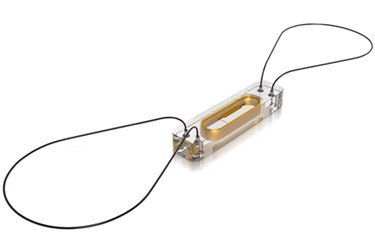St. Jude's CardioMEMS Improves Another Patient Outcome
By Chuck Seegert, Ph.D.

The newly released CardioMEMS device for real-time monitoring of congestive heart failure (CHF) is now being used at the University of California San Francisco (UCSF). Procedures to implant this device are currently offered at only a few top medical centers, but its early success is leading to greater excitement.
CHF is the chronic inhibition of heart performance, and it can be caused by a number of disease processes. Essentially, the heart has difficulty pumping blood to the rest of the body, which can result in a limited oxygen supply to other tissues. If left unchecked, CHF can cause a rapid downward spiral leading to hospital and emergency room visits. These visits are stressful to the patient and expensive, which is unfortunate because they can be avoided with proper monitoring.
St. Jude Medical’s new device, the CardioMEMS, was recently approved by the FDA, and it helps monitor CHF symptoms in real-time. The device is permanently implanted in a patient’s distal pulmonary artery where it captures heart rate and arterial pressure data and transmits it continuously, according to a recent press release.
At present, only a few hospitals in the country have been authorized to use the cutting-edge monitoring technology. West Virginia University is one, and, with a procedure performed last month, UCSF is now counted among them.
The first patient to receive the CardioMEMS at UCSF is Norman Marigney of Santa Rosa, a patient who requires constant monitoring.
“They told me I was the first patient here at UCSF to undergo this procedure,” Marigney said in the press release. “I was nervous the night before but was excited the morning of. I’m just happy to have been chosen.”
Once Norman returned home, he was able to monitor heart rate and arterial pressures using a special antenna built into a pillow. The data is now securely transmitted to his caregivers who can make up-to-the-minute recommendations, according to the press release.
Many CHF patients rely on blood pressure measurements and scales to weigh themselves as a way to monitor their condition. Unfortunately, these methods have been shown to be less accurate than implants or in-office visits. The arterial pressure measured by the CardioMEMS has been shown to detect abnormalities much sooner than blood pressure or weight gain. According to the press release, catching these signs earlier can lead to a decreased chance of hospitalization.
While the use of scales and blood pressure cuffs is less optimal than the CardioMEMS, the methods have shown some success. In a recent article published on Med Device Online, they were shown to have efficacy when coupled with tablets used for online training and consultation with caregivers.
